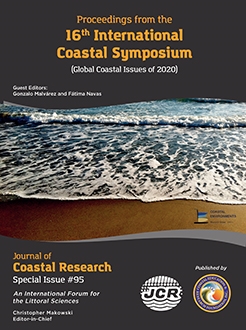Lee, J.; Kwon, S.; Hong, S.; Lee, W.D.; Ha, T.; Cho, W.C., and Lee, J.L., 2020. Introduction to the Blue Flag Award: An eco-friendly beach certification program in South Korea. In: Malvárez, G. and Navas, F. (eds.), Global Coastal Issues of 2020. Journal of Coastal Research, Special Issue No. 95, pp. 850–854. Coconut Creek (Florida), ISSN 0749-0208.
Beaches have long been sources of public recreation, and beach tourism is one of the largest industries in the world. However, these factors have led to damage to beach ecologies. As a solution to this issue, several beach-related eco-friendly awards, such as the Blue Flag, Seaside Awards, and Good Beach Guide, have been instituted in South Korea. In this study, we focus on the Blue Flag award, what it constitutes, and how the certification can be received. The Blue Flag is operated by the Foundation for Environmental Education (FEE) and is awarded to eco-friendly beaches, marinas, and sightseeing boat operators. The awarding criteria are divided into four categories: environmental education and information, water quality, environmental management, safety and services. The FEE has instituted long-term requirements for applying for the award. First, the candidate beach must apply for a new Blue Flag. Second, a beach risk assessment must be conducted. Third, a feasibility study must be conducted to confirm that the country has a basic capacity to retain the Blue Flag. Fourth, a gap analysis must be conducted to confirm that the candidate beach meets the Blue Flag criteria. Fifth, the beach must be operated for one year in a Blue Flag pilot phase. In South Korea, the FEE Korea has been conducting risk assessments, feasibility studies, and gap analyses for Sinji Myeongsasimni Beach in Wando county. Moreover, the FEE has operated the beach according to the requirements of the Blue Flag pilot phase for one year. In this study, we introduce the concept of Blue Flag and the steps that must be completed to receive the award. In future studies, we plan to compare the different eco-friendly awards for beaches and to analyze the ways they help in conserving the environment.





